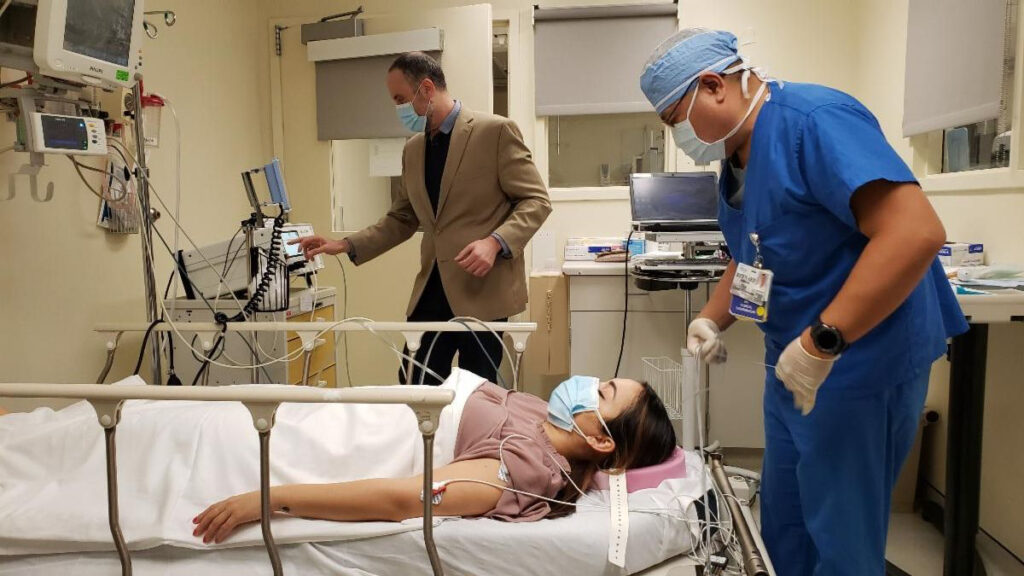
Trinitas Mood Disorders Treatments
In the midst of a comprehensive Behavioral Health facilities expansion, Trinitas Regional Medical Center announces the consolidation of all major treatments into a single, customized delivery system – one that now includes esketamine and Electroconvulsive Therapy (ECT). The advanced approach to mental health services complements a future-focused rethinking of how mood disorders are evaluated and treated.
Each patient’s care will be tailored to his or her particular symptoms, history and lifestyle, according to Dr. James McCreath, Vice President of Behavioral Health at Trinitas. “Our approach to delivering treatment to our patients has always been based on what’s most suitable for the individual,” he says. “Introducing new options this year allows us to further tailor our treatments, adding to the benefit of having one of the largest hospital-based mood disorder programs in New Jersey.”
Dr. McCreath and Dr. Salvatore Savatta, Chair of Psychiatry, cite the advantages of these new options to patients experiencing severe forms of depression. “In cases of refractory depression – when a patient fails to respond to more traditional antidepressants – esketamine and ECT can provide substantial relief.”
Used in tandem with traditional psychiatric medications and evidence-based psychotherapies such as dialectical behavioral therapy (DBT) or cognitive behavioral therapy (CBT), also available at Trinitas, these new options complete what McCreath calls a “highly integrated array of therapies” at the practitioners’ disposal. Esketamine, which is also helpful for patients with more challenging types of depression, is delivered as a nasal spray. The unilateral ultra-brief pulse delivery of ECT now in use at Trinitas has been shown to be nearly as effective as the previous bi-lateral approach, with the added benefit of patients experiencing far fewer side effects, such as memory loss. With regards to ECT, Dr. Savatta says it’s important for people to consider all available options when undergoing treatment for severe mood disorders.
“There are many misconceptions about how today’s ECT affects the mind, even what this treatment looks like,” he says. “People base it on what they’ve heard or seen on TV and in the movies. And even those depictions of old-fashioned ECT treatments were largely inaccurate. We need to remove the stigma surrounding ECT so more people can feel comfortable seeking out and receiving the treatment they need.”
Above all else, practitioners at Trinitas deliver compassionate care – an attribute that no technology can offer in itself. “We’re always striving to show compassion to our patients, and to their families,” Dr. Savatta says. “People who come to Trinitas for Behavioral Health treatment will find a vibrant, young, and experienced team of forward-thinking providers who have all of today’s treatment options at the ready.”
Those treatment options are available to address a broad range of mood disorders, which distort an individual’s emotional state and can affect his or her ability to carry on a normal life. Mood disorders can include any impairment that leaves a person feeling unusually sad, depressed, or anxious, and manic conditions in which a person’s quickly alternates between extreme depression and excessive happiness. Major depressive disorder, bipolar disorder, seasonal affective disorder, and generalized anxiety are among the most common types of mood disorders for which patients may seek treatment.
The Trinitas Department of Behavioral Health and Psychiatry provides treatment to patients of all ages, as well as family-based services. The Center offers a 98-bed inpatient facility and a specialized unit for adults with mental or developmental disabilities. Prior to the pandemic, Trinitas provided more than 15,000 outpatient visits a month. The team of practitioners, including several bilingual team members, encompasses every facet of mental health service needs: Psychiatrists, Psychologists, Licensed Social Workers, Substance Abuse Counselors, Creative Arts Therapists and many other types of professionals are available to treat patients. Specialized Services include parenting groups, women’s services, geropsychiatry, an adolescent residential program, and programs for individuals with HIV. Survivors of domestic violence, sexual abuse can also receive specialized care, as can juvenile offenders or persons requiring justice-involved services.
For more than 50 years, Trinitas Regional Medical Center – formerly Elizabeth General Hospital – has been one of the area’s leading providers of Behavioral Health services. Reach out today to learn more: 908-994-7556.
About Trinitas Regional Medical Center
Trinitas Regional Medical Center, a major center for comprehensive health services for those who live and work in Central New Jersey, is a Catholic teaching medical center sponsored by the Sisters of Charity of Saint Elizabeth in partnership with Elizabethtown Healthcare Foundation. With 12 Centers of Excellence across the continuum of care, Trinitas has distinguished itself in cardiology, cancer care, behavioral health, renal care, nursing education, diabetes management, wound healing and sleep medicine. For more information on Trinitas Regional Medical Center, visit: TrinitasRMC.org or call 908-994-5138.

